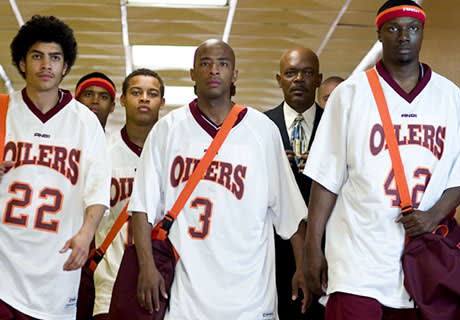Samuel L. Jackson once again makes the most of a part that's beneath him in this uplifting but slightly inadequate drama. Jackson plays Ken Carter, the controversial inner-city high-school basketball coach who in 1999 benched his undefeated team for their low academic scores; though he spent a season in hell being vilified by parents and colleagues, he refused to write off his team as no-hopers with nothing to look forward to but the memory of victory.
The film's insistence on the worth of devalued, poor and largely black lives is laudable and resonant enough to make one wish that this film was better; in its corner are Jackson at his authoritative live-wire best, a talented supporting cast that acquits itself admirably and a production that is brought off with no small degree of competence (though it stops well short of artistry). But it falls prey to Hollywood's irritating requirement of a single representative figure, and so Coach Carter's saga winds up subsuming that of the people he's supposed to be helping.
As heroic as Carter's efforts are, he'd most likely agree that he's simply the medium to the actualisation of others, and so his promotion from role model to messiah is a major stumbling block the film never overcomes. Subplots involving various team-mates' issues with teen pregnancy and gang violence seem tacked on to a main narrative line so fascistically rigid that it fails to accommodate the myriad individuals who occupy the movie.
The film is far from being without merit, but it commits so completely to standard Hollywood procedure that it's held back from being as important as the people in Carter's care. (Paramount)
The film's insistence on the worth of devalued, poor and largely black lives is laudable and resonant enough to make one wish that this film was better; in its corner are Jackson at his authoritative live-wire best, a talented supporting cast that acquits itself admirably and a production that is brought off with no small degree of competence (though it stops well short of artistry). But it falls prey to Hollywood's irritating requirement of a single representative figure, and so Coach Carter's saga winds up subsuming that of the people he's supposed to be helping.
As heroic as Carter's efforts are, he'd most likely agree that he's simply the medium to the actualisation of others, and so his promotion from role model to messiah is a major stumbling block the film never overcomes. Subplots involving various team-mates' issues with teen pregnancy and gang violence seem tacked on to a main narrative line so fascistically rigid that it fails to accommodate the myriad individuals who occupy the movie.
The film is far from being without merit, but it commits so completely to standard Hollywood procedure that it's held back from being as important as the people in Carter's care. (Paramount)
